Alicia Anabel Santos is author of the memoir, Finding Your Force: A Journey to Love, which was listed in the Advocate’s “21 LGBT Biographies and Memoirs You Should Read Right Now.” Most recently she is the recipient of the 2018 Bronx Recognizes Its Own (BRIO) Award in fiction for her novel in progress. Santos is the founder and curator of the NYC Latina Writers Group, which has met monthly since 2006 offering writing workshops, events, and readings across genres. Her work has appeared in several anthologies, magazines, and online publications. When not organizing and facilitating writing workshops, she is a writing coach, aka The Writing Midwife, a filmmaker, playwright, teaching artist, and priestess. She has spent the last ten years working on the documentary Afrolatinos: The Untaught Story, which screened at the United Nations in 2017.
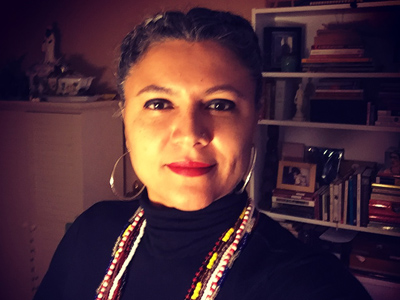 For almost twelve years, the NYC Latina Writers Group (NYCLWG) has been meeting monthly for writing workshops and literary events. Our writers have gone on to have successful writing careers, developing one-woman shows, and writing plays. They have published and self-published memoirs and chapbooks and have started their own blogs. While many of us are publishing, some of our writers have lost hope. This was when our director of programs Wendy Angulo and I decided to look at the needs of the writers within our collective. What we discovered was that most of us needed more time to write and more workshops that would help us hone our craft.
For almost twelve years, the NYC Latina Writers Group (NYCLWG) has been meeting monthly for writing workshops and literary events. Our writers have gone on to have successful writing careers, developing one-woman shows, and writing plays. They have published and self-published memoirs and chapbooks and have started their own blogs. While many of us are publishing, some of our writers have lost hope. This was when our director of programs Wendy Angulo and I decided to look at the needs of the writers within our collective. What we discovered was that most of us needed more time to write and more workshops that would help us hone our craft.
During a conversation one evening with my partner, educator and poet Yoseli Castillo Fuertes, we talked about the lack of representation of Latinx writers in literature, as well as the absence of writing opportunities for Latinx/WWOC writers. That evening the Sankofa Sisterhood Writers Retreat was born. Now in our fourth year we realized that in order to have some of our favorite authors and writers facilitate workshops we needed funding. This is where the generous support of Poets & Writers comes in. We are so grateful that this year, the NYC Latina Writers Group and the Sankofa Sisterhood have received funding for our writing workshops.
This past Memorial Day weekend, sixteen writers of color met at a cabin in the woods for a weekend of writing workshops and an open mic, where each writer got to share their work. As many writers know, writing can be isolating and lonely. Oftentimes, we crave an audience to help bounce ideas off of, or inspire new ones. One of the challenges many writers are faced with is carving out time for writing, and this is particularly challenging for women of color writers. Working with writers over the years, I have witnessed and heard countless stories about how hard it is to come to the page. This is why creating a safe space for writers of color is important to me. We lift one another. We remind each other that we are capable. We encourage one another to submit despite the fear of rejection.
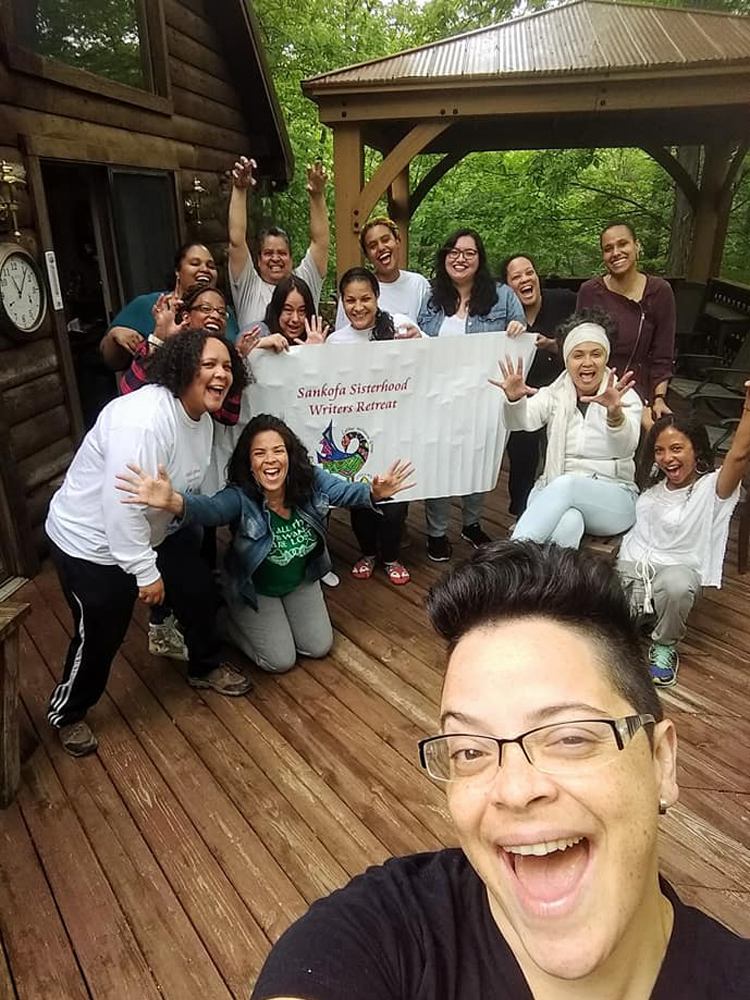 This year’s theme at Sankofa was “Strengthening the Writer’s Core.” Our workshops were centered on writing the story from the inside out. Each facilitator took the writers through prompts and activities to help get inside the stories we are writing and to feel everything that must be felt in order to find and show the truth in the story, poem, or essay.
This year’s theme at Sankofa was “Strengthening the Writer’s Core.” Our workshops were centered on writing the story from the inside out. Each facilitator took the writers through prompts and activities to help get inside the stories we are writing and to feel everything that must be felt in order to find and show the truth in the story, poem, or essay.
With the sponsorship of Poets & Writers, we were able to receive grants for two of our workshop facilitators, Vanessa Mártir and Mariposa Fernandez, for which we are so grateful. In the “Writing and the Body” workshop, Vanessa took us through a series of writing activities and prompts designed to help us explore the story behind the story, dig for the truth, and not fear what wants to rise. She showed us how we can access these stories in our bodies. Mariposa facilitated the workshops “Feeling & Healing” and “Sense & Sound,” as well as a performance workshop. In Mariposa’ s “Feeling & Healing” workshop, she used reiki to help us connect to the writing, which allowed for an opening of our creativity.
There is often guilt around taking time to write, for fear of being seen as selfish. And this is precisely what the Sankofa Sisterhood is all about: It is a weekend designed for writers to be selfish and get the writing done. We understand that in order for the writing to happen, we need to create the space to make it happen.
During our closing Sankofa ceremony, every writer sat in a circle and each one shared what they would take from the weekend and all that they gained from the four workshops and keynote speech. One of the writers shared that for the past three years Sankofa has been her new year, where she is able to reboot, recharge, and set intentions for what she wants to create during the year. This is why the Sankofa Sisterhood was created and what is the very heartbeat of the NYC Latina Writers Group. We have become a place of refuge, a place where writers of color can find their voice and know that in “this place” our stories matter, we matter.
NYCLWG workshops are open to all Latinx women and women of color, women identified and nonbinary. We have workshops coming in June at the Bronx Academy of Art and Dance (BAAD), the NYCLWG Writers Conference, and we will be celebrating our twelth anniversary of the NYCLWG this October. For more information, find us on Facebook or e-mail us.
Support for the Readings & Workshops Program in New York is provided, in part, by public funds from the New York State Council on the Arts, with additional support from the Friends of Poets & Writers.
Photos: (top) Alicia Anabel Santos ( Credit: Alicia Anabel Santos). (bottom) (front, left to right) Yoseli Castillo Fuertes, Liza Morales, Alicia Anabel Santos, Mariposa Fernandez (back, left to right) Azúcar Simone, Nichole Perry, Rebeca Lois, Danielle Stelluto, Maribelle, Vanessa Mártir, Ysanet Batista, Fanny Castillo, Nia Ita Sanchez (Credit: Sarahi Almonte).




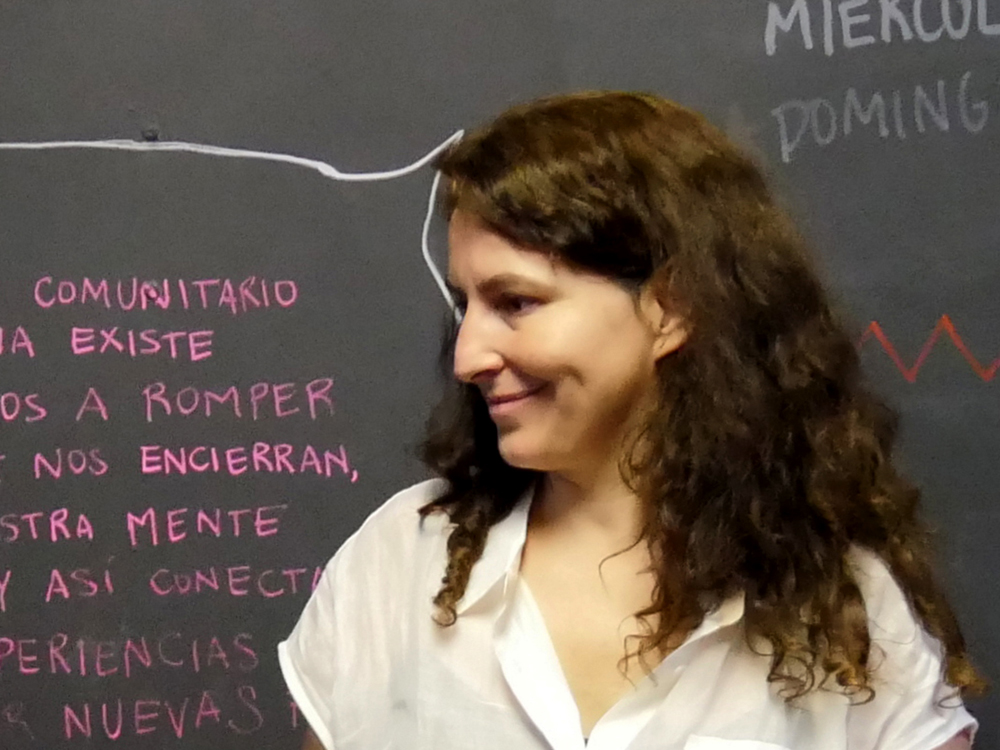 How did your work with the
How did your work with the 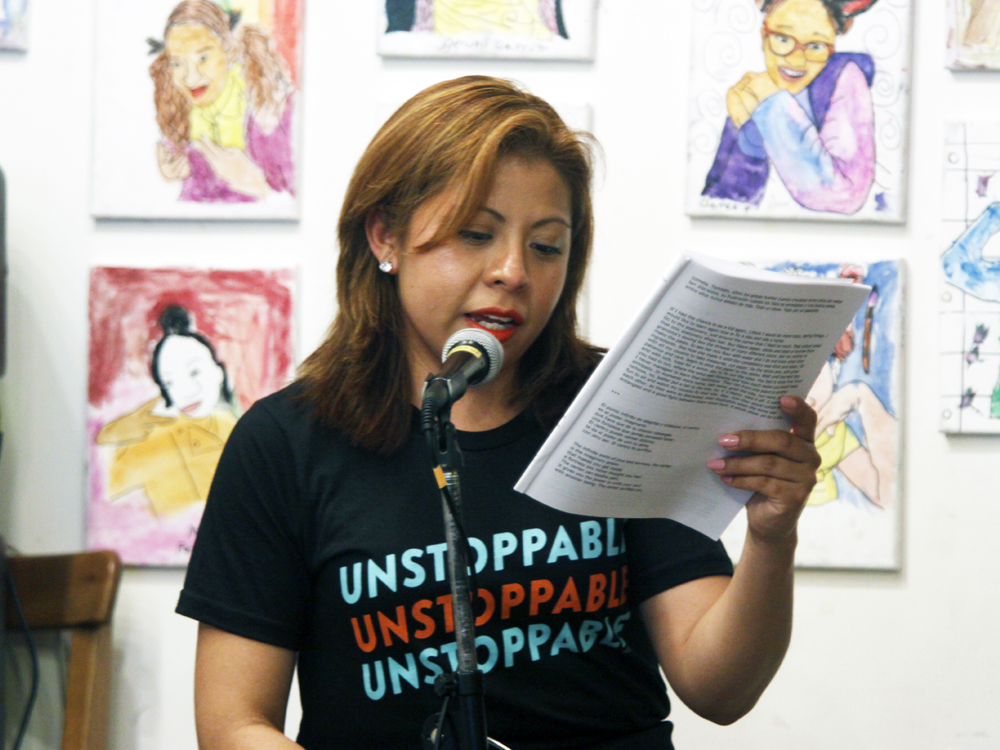 We talk about how the ability to create with words isn’t something alien to us—something that belongs only to those who had the privilege of studying and spending time reading—but rather something that we all do when we speak to each other in everyday life. We also talk about how writing is generated starting with a draft and then through multiple rewritings, not in one shot and then set in stone. These conversations also help us get writing.
We talk about how the ability to create with words isn’t something alien to us—something that belongs only to those who had the privilege of studying and spending time reading—but rather something that we all do when we speak to each other in everyday life. We also talk about how writing is generated starting with a draft and then through multiple rewritings, not in one shot and then set in stone. These conversations also help us get writing.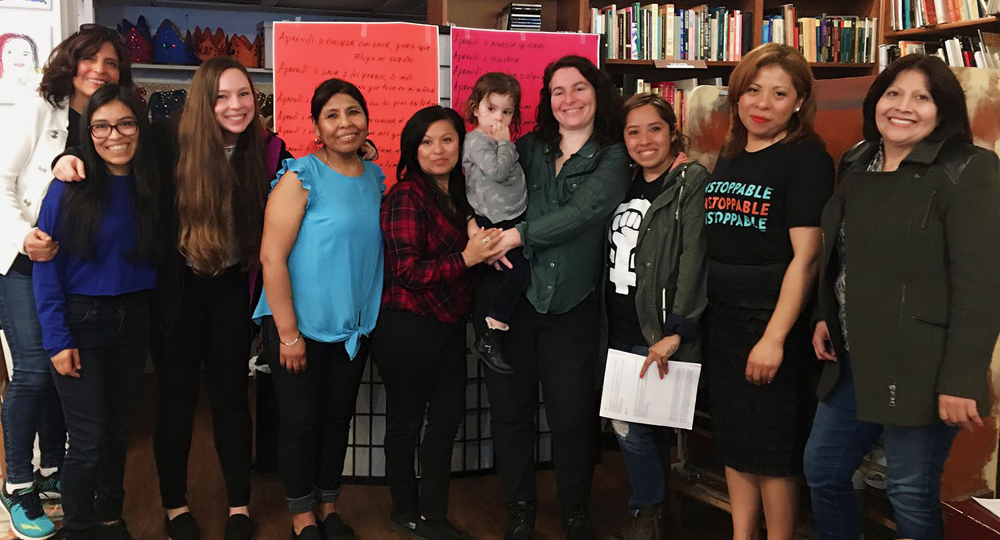
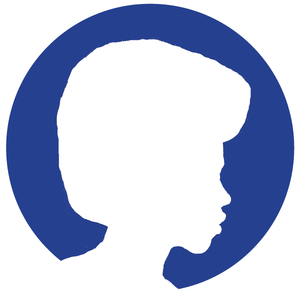
 For almost twelve years, the NYC Latina Writers Group (NYCLWG) has been meeting monthly for writing workshops and literary events. Our writers have gone on to have successful writing careers, developing one-woman shows, and writing plays. They have published and self-published memoirs and chapbooks and have started their own blogs. While many of us are publishing, some of our writers have lost hope. This was when our director of programs Wendy Angulo and I decided to look at the needs of the writers within our collective. What we discovered was that most of us needed more time to write and more workshops that would help us hone our craft.
For almost twelve years, the NYC Latina Writers Group (NYCLWG) has been meeting monthly for writing workshops and literary events. Our writers have gone on to have successful writing careers, developing one-woman shows, and writing plays. They have published and self-published memoirs and chapbooks and have started their own blogs. While many of us are publishing, some of our writers have lost hope. This was when our director of programs Wendy Angulo and I decided to look at the needs of the writers within our collective. What we discovered was that most of us needed more time to write and more workshops that would help us hone our craft. This year’s theme at Sankofa was “Strengthening the Writer’s Core.” Our workshops were centered on writing the story from the inside out. Each facilitator took the writers through prompts and activities to help get inside the stories we are writing and to feel everything that must be felt in order to find and show the truth in the story, poem, or essay.
This year’s theme at Sankofa was “Strengthening the Writer’s Core.” Our workshops were centered on writing the story from the inside out. Each facilitator took the writers through prompts and activities to help get inside the stories we are writing and to feel everything that must be felt in order to find and show the truth in the story, poem, or essay.